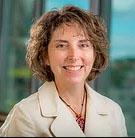AFP Rhode Island Chapter on Addressing Racism, Living by the Principles of IDEA

AFP recently had the chance to speak with Kelly Nevins, CEO of the Women’s Fund of Rhode Island and chair of the Inclusion, Diversity, Equity and Access (IDEA) Committee for the AFP Rhode Island Chapter. Kelly shares how her chapter incorporates IDEA principles into their work and how they are addressing racism within their community.
Why is Inclusion, Diversity, Equity and Access important to your Chapter

The AFP Rhode Island Chapter has long included diversity aspirations in our chapter policies. However, when AFP Global introduced IDEA, we knew we had to put some muscle behind the words. We created our IDEA committee in 2018 and updated the board resolution on IDEA. Initially, we focused programming around women in the industry. In 2019, we conducted a study that looked at the diversity of CEOs and board members at Rhode Island's largest nonprofits and found that while our percentage of women in leadership wasn't equitable to men, it was significantly better than our percentage of people of color in those roles. We knew we needed to provide some thought leadership around this, particularly as Rhode Island doesn't have a nonprofit network/association outside of AFP-Rhode Island. [You can access the report on our resource page at Resources - AFP-Rhode Island Chapter (afpglobal.org).]
How did your chapter first introduce the importance of addressing racism to your community and your membership?
The research report led to committee and board member discussions about what we as a chapter could do to diversify Rhode Island's nonprofit leadership and the leadership pipeline. We took our report’s findings on a "roadshow," speaking at the local Grant Makers Council and appearing on local media. Then, George Floyd was murdered, and anti-racism protests began happening all over the country.
Members of the IDEA committee wanted to be more explicit in leading a movement toward ending racism, including naming the fact that much of our wealth in this country is rooted in white supremacy. The committee worked with the board, other committees, the general membership and the broader community to develop an anti-racism policy and strategy, which we recently released to the public. We hosted a book club discussion on “Decolonizing Wealth” and have several programs planned throughout 2021 that will address IDEA and anti-racism.
What are your chapter’s goals for helping your community combat racism?
Our anti-racism policy and strategy can be accessed at Resources - AFP-Rhode Island Chapter (afpglobal.org). We are integrating these strategies into our new strategic plan, and all committees have agreed to include components of it in their work so that the strategy does not get siloed within IDEA.
Highlights of the strategy include:
- Educating our membership about anti-racist practices within the fundraising industry and advocating for them throughout Rhode Island;
- Increasing representation and involvement of Black and Indigenous people and people of color (BIPOC) on our board, committees, honorees and as chapter speakers;
- Devoting scholarship funds for membership and programming with the purpose of opening up opportunities for professional development to BIPOC fundraising professionals and future fundraisers;
- Ensuring our communication tools and materials follow inclusive language guidelines; and
- Conducting an anti-racism audit every two years and adjusting our strategies to meet new guideposts.
What accomplishments are you most proud of in this space?
We are taking a bold and public stance on anti-racism. But we also know this will be a work in progress. We are likely to get some negative feedback from the broader community, including from our communities of color who have dealt with lots of organizations saying empty words without action. However, the board and committee leadership fully back the strategy. It is important that we begin somewhere and learn where we may stumble.
Anything else you would like to share about the training, programming, education and content?
Our goal is to weave IDEA into everything that is happening within the chapter. Most of the programs planned for the year will include some discussion around diversity and equity, including book club discussions. Our March program will feature Black philanthropists and address some of the unique challenges faced by those trying to raise money for issues that specifically impact Black people. We are exploring programming around community-centric fundraising and trust-based philanthropy, and we hope to release some thought leadership pieces related to those topics.
We would welcome the opportunity to partner with other chapters interested in these topics! Those who would like to explore opportunities to partner, or even to learn more about what we are doing, are welcome to email me at knevins@wfri.org.

